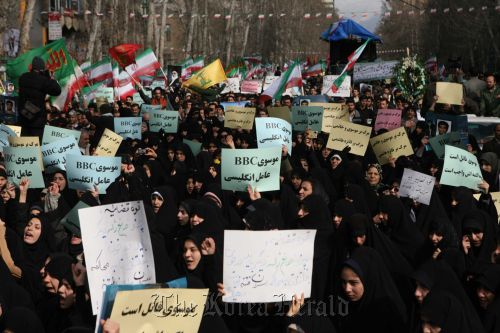WASHINGTON (AFP) ― Reeling from the fall of its ally Hosni Mubarak of Egypt, the United States is hitting back at Iran as the arch foes fight for influence in a Middle East upended by popular unrest, analysts said.
Iran presents Mubarak’s fall as a new sign of Washington’s and Israel’s decline in the region, but the United States sees opportunities in a new outbreak of anti-government protests in the Islamic republic.
More broadly, analysts said, Iran frames the anti-government unrest sweeping the Middle East as inspired by Iran’s 1979 Islamic revolution, while the United States paints it as a democratic trend it inherently supports.
“We’re going to see a more heightened rhetorical posture by the United States,” said Trita Parsi, president of the National Iranian American Council, which seeks to advance Iranian-American community interests.
Iran presents Mubarak’s fall as a new sign of Washington’s and Israel’s decline in the region, but the United States sees opportunities in a new outbreak of anti-government protests in the Islamic republic.
More broadly, analysts said, Iran frames the anti-government unrest sweeping the Middle East as inspired by Iran’s 1979 Islamic revolution, while the United States paints it as a democratic trend it inherently supports.
“We’re going to see a more heightened rhetorical posture by the United States,” said Trita Parsi, president of the National Iranian American Council, which seeks to advance Iranian-American community interests.

The tougher verbal stance, he added, is driven mainly by the United States seeking to put Iran on the defensive after it tried to use events in Egypt to “undermine America’s position” in the region.
“They’re jockeying for position in the Middle East. The order in the Middle East is crumbling. Iran is positioning itself surprisingly as a real contender against the U.S.,” Parsi said.
“Having one pillar of the U.S.’s order in the region ― Egypt ― fall is clearly creating some nervousness in the U.S.,” said Parsi, whose non-partisan organization offers advice to the U.S. administration.
“How will this play out in the rest of the region? What will be the view other states have of U.S. reliability (toward allies)? The Iranians are trying to turn this into a victory for themselves, not just a loss for the U.S.”
He said the new round of protests in Iran provide Washington “an opportunity to hit back.”
Analyst Suzanne Maloney also pointed to a “sharper” U.S. tone toward Iran, but said it owed in part to President Barack Obama’s administration being pessimistic about short-term prospects for dialogue with Iran on its nuclear ambitions.
Obama came closer to encouraging demonstrators in Iran on Tuesday than ever before when he said he hoped they would have the “courage” to continue expressing their “yearning for greater freedoms.”
Despite its new rhetoric on the showdown, Washington still insists it cannot dictate events inside Iran ― which saw anti-government unrest break out after disputed presidential elections in 2009.
Maloney, a former State Department policy advisor on Iran who is now a senior fellow at the Brookings Institution, acknowledged that Iran, at least in the short-term, seems to be gaining ground against the United States.
In the last few years, non-Arab Shiite Iran has gained influence in Iraq, Lebanon and the Palestinian territories, and it could see its clout rise higher as mass protests spread to Yemen and Bahrain. Among them, all but the Palestinian territories have majority or significant Shiite populations.
In Egypt, Maloney said, Washington can now no longer be sure that a future government in Cairo backs U.S. peacemaking aims.
But there is a “silver lining” for the U.S. government in the longer-term, she said, because the popular revolts that toppled Mubarak in Egypt and Zine al-Abidine Ben Ali in Tunisia have presented Arabs with an alternative vision.
“The definition of heroism in the Middle East prior to January was a government that was willing to stand up to Washington, so Iran kind of easily fit into that role,” Maloney said.
“I think the definition of heroism is now individuals willing to stand up to repression, and the Iranian regime is on the wrong side of that story.”
But Karim Sadjadpour of the Carnegie Endowment for International Peace said it was easier for the Iranian leadership to resist change than the one in Egypt.
“American-backed autocracies, like Mubarak’s Egypt, are more vulnerable than anti-American dictatorships like Iran, for they are subject to the scrutiny of American politics and public opinion,” he said in an email exchange.
“Iran can slaughter its people without worrying that China or Russia is going to hold it accountable, or withhold aid money.
“I don’t think the U.S. government has any illusions that the Iranian regime is on the verge of collapse. That said, it was equally unthinkable six months ago that Mubarak and Ben-Ali would no longer be around,” Sadjadpour added.











![[Today’s K-pop] BTS pop-up event to come to Seoul](http://res.heraldm.com/phpwas/restmb_idxmake.php?idx=644&simg=/content/image/2024/04/17/20240417050734_0.jpg&u=)




![[KH Explains] Hyundai's full hybrid edge to pay off amid slow transition to pure EVs](http://res.heraldm.com/phpwas/restmb_idxmake.php?idx=652&simg=/content/image/2024/04/18/20240418050645_0.jpg&u=20240419100350)

